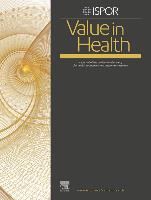ISPOR Value in Health Themed Section Includes Work From Australia, Uganda, the United States, and The Netherlands
 Lawrenceville, NJ, USA—June 6, 2022—Value in Health, the official journal of ISPOR—The Professional Society for Health Economics and Outcomes Research, announced today the publication of a series of articles assessing the value of remote patient monitoring in addressing challenges in patient care. The guest editor for the themed section was Beth Devine, PhD, PharmD, MBA, The Comparative Health Outcomes, Policy, and Economics (CHOICE) Institute, University of Washington, Seattle, WA, USA. The series was published in the June 2022 issue of Value in Health.
Lawrenceville, NJ, USA—June 6, 2022—Value in Health, the official journal of ISPOR—The Professional Society for Health Economics and Outcomes Research, announced today the publication of a series of articles assessing the value of remote patient monitoring in addressing challenges in patient care. The guest editor for the themed section was Beth Devine, PhD, PharmD, MBA, The Comparative Health Outcomes, Policy, and Economics (CHOICE) Institute, University of Washington, Seattle, WA, USA. The series was published in the June 2022 issue of Value in Health.
“The use of digital health has risen in recent years,” said Dr Devine in her opening editorial, “and one important component of digital health is remote patient monitoring, or RPM. RPM involves the noninvasive collection and recording of data from a distance, by a clinician, or use of wearable devices, peripheral devices, or other platforms. As with digital health solutions in general, the overarching goal of RPM solutions is to increase efficiency and improve care quality, while minimizing the burden of doing so. In this themed section of Value in Health, we feature a collection of articles that describes research using RPM solutions to achieve these goals. While presenting a wide range of issues relevant to RPM, these papers illustrate various methods and topics, ranging from systematic reviews and cost-effectiveness studies to implementation research, qualitative studies, and theoretical papers.”
In her introductory editorial, “Assessing the Value of Remote Patient Monitoring Solutions in Addressing Challenges in Patient Care,” Dr Devine includes a brief overview of the topic and introduces the 6 articles in the series:
- “Economic Evaluation of Remote Patient Monitoring for Chronic Disease: A Systematic Review,” by Keshia R. De Guzman, Centaine L. Snoswell, Monica L. Taylor, Leonard C. Gray, and Liam J. Caffery
- “Cost and Cost-Effectiveness of a Digital Adherence Technology for Tuberculosis Treatment Support in Uganda,” by Ryan R. Thompson, Alex Kityamuwesi, Alice Kuan, et al.
- “One-Year Costs Associated With the VA National TeleStroke Program,” by Todd H. Wagner, Lena Schoemaker, Elizabeth Gehlert, et al.
- “A Cost-Utility Analysis of Remote Pulse-Oximeter Monitoring of COVID-19 Patients,” by William V. Padula, Marlea A. Miano, Marcella A. Kelley, et al.
- “Electronic Patient Symptom Management Program to Support Patients Receiving Cancer Treatment at Home During the COVID Pandemic,” by Debra Wujcik, William N. Dudley, Matthew Dudley, Vibha Gupta, and Jeannine Brant
- “Stepwise Design and Evaluation of a Values-Oriented Ambient Intelligence Healthcare Monitoring Platform,” by Merlijn Smits, Metin Nacar, Geke Ludden, and Harry van Goor
“The findings from these studies suggest that RPM solutions can be cost-effective compared to usual care, although these findings may be disease-specific, context-specific, and require scale-up to achieve cost-effectiveness. RPM solutions also appear to increase adherence to therapies, improve guideline-concordant care, and contribute to more rapid symptom resolution,” said Devine. “Overall, we believe that the economic evidence presented in this collection of studies may be useful to decision makers who are contemplating investments in RPM solutions, enabling them to set up incentive structures for health systems that realize the cost-effectiveness of these interventions. Important future work should include optimizing the design of RPM solutions, then exploring in greater detail the acceptance of these by a variety of patients and providers using designs that are functional, user-friendly and, ultimately, provide value in improving patient outcomes.”
###
ABOUT ISPOR
ISPOR, the professional society for health economics and outcomes research (HEOR), is an international, multistakeholder, nonprofit dedicated to advancing HEOR excellence to improve decision making for health globally. The Society is the leading source for scientific conferences, peer-reviewed and MEDLINE®-indexed publications, good practices guidance, education, collaboration, and tools/resources in the field.
Website | LinkedIn | Twitter (@ispororg) | YouTube | Facebook | Instagram
ABOUT VALUE IN HEALTH
Value in Health (ISSN 1098-3015) is an international, indexed journal that publishes original research and health policy articles that advance the field of health economics and outcomes research to help healthcare leaders make evidence-based decisions. The journal’s 2020 impact factor score is 5.725 and its 5-year impact factor score is 6.932. Value in Health is ranked 4th of 98 journals in health policy and services, 9th of 108 journals in healthcare sciences and services, and 24th of 376 journals in economics. Value in Health is a monthly publication that circulates to more than 10,000 readers around the world.
Website | Twitter (@isporjournals)